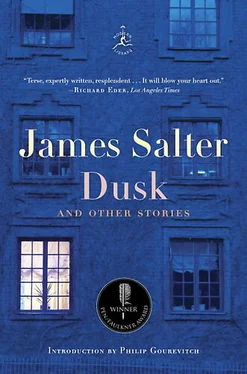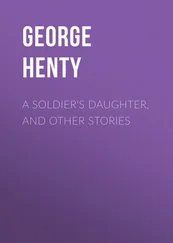“Do you mean to be discovered by each of us?” Hirsch asked him.
“No,” Salter said. “I don’t think it can be invented by everyone; that would be too chaotic. I’m referring to the classical, to the ancient, the cultural agreement that there are certain virtues and that these virtues are untarnishable.” Of course, his characters and the worlds they live in are frequently tarnished. Yet he is a writer who still believes in heroism, and he makes one feel that writing, when it is done well and truly, is as right a way to live and die as there is.
Barcelona at dawn. The hotels are dark. All the great avenues are pointing to the sea.
The city is empty. Nico is asleep. She is bound by twisted sheets, by her long hair, by a naked arm which falls from beneath her pillow. She lies still, she does not even breathe.
In a cage outlined beneath a square of silk that is indigo blue and black, her bird sleeps, Kalil. The cage is in an empty fireplace which has been scrubbed clean. There are flowers beside it and a bowl of fruit. Kalil is asleep, his head beneath the softness of a wing.
Malcolm is asleep. His steel-rimmed glasses which he does not need—there is no prescription in them—lie open on the table. He sleeps on his back and his nose rides the dream world like a keel. This nose, his mother’s nose or at least a replica of his mother’s, is like a theatrical device, a strange decoration that has been pasted on his face. It is the first thing one notices about him. It is the first thing one likes. The nose in a sense is a mark of commitment to life. It is a large nose which cannot be hidden. In addition, his teeth are bad.
At the very top of the four stone spires which Gaudi left unfinished the light has just begun to bring forth gold inscriptions too pale to read. There is no sun. There is only a white silence. Sunday morning, the early morning of Spain. A mist covers all of the hills which surround the city. The stores are closed.
Nico has come out on the terrace after her bath. The towel is wrapped around her, water still glistens on her skin.
“It’s cloudy,” she says. “It’s not a good day for the sea.”
Malcolm looks up.
“It may clear,” he says.
Morning. Villa-Lobos is playing on the phonograph. The cage is on a stool in the doorway. Malcolm lies in a canvas chair eating an orange. He is in love with the city. He has a deep attachment to it based in part on a story by Paul Morand and also on an incident which occurred in Barcelona years before: one evening in the twilight Antonio Gaudi, mysterious, fragile, even saintlike, the city’s great architect, was hit by a streetcar as he walked to church. He was very old, white beard, white hair, dressed in the simplest of clothes. No one recognized him. He lay in the street without even a cab to drive him to the hospital. Finally he was taken to the charity ward. He died the day Malcolm was born.
The apartment is on Avenida General Mitre and her tailor, as Nico calls him, is near Gaudi’s cathedral at the other end of town. It’s a working-class neighborhood, there’s a faint smell of garbage. The site is surrounded by walls. There are quatrefoils printed in the sidewalk. Soaring above everything, the spires. Sanctus, sanctus , they cry. They are hollow. The cathedral was never completed, its doors lead both ways into open air. Malcolm has walked, in the calm Barcelona evening, around this empty monument many times. He has stuffed peseta notes, virtually worthless, into the slot marked: DONATIONS TO CONTINUE THE WORK. It seems on the other side they are simply falling to the ground or, he listens closely, a priest wearing glasses locks them in a wooden box.
Malcolm believes in Malraux and Max Weber: art is the real history of nations. In the details of his person there is evidence of a process not fully complete. It is the making of a man into a true instrument. He is preparing for the arrival of that great artist he one day expects to be, an artist in the truly modern sense which is to say without accomplishments but with the conviction of genius. An artist freed from the demands of craft, an artist of concepts, generosity, his work is the creation of the legend of himself. So long as he is provided with even a single follower he can believe in the sanctity of this design.
He is happy here. He likes the wide, tree-cool avenues, the restaurants, the long evenings. He is deep in the currents of a slow, connubial life.
Nico comes onto the terrace wearing a wheat-colored sweater.
“Would you like a coffee?” she says. “Do you want me to go down for one?”
He thinks for a moment.
“Yes,” he says.
“How do you like it?”
“Solo,” he says.
“Black.”
She likes to do this. The building has a small elevator which rises slowly. When it arrives she steps in and closes the doors carefully behind her. Then, just as slowly, she descends, floor after floor, as if they were decades. She thinks about Malcolm. She thinks about her father and his second wife. She is probably more intelligent than Malcolm, she decides. She is certainly stronger-willed. He, however, is better-looking in a strange way. She has a wide, senseless mouth. He is generous. She knows she is a little dry. She passes the second floor. She looks at herself in the mirror. Of course, one doesn’t discover these things right away. It’s like a play, it unfolds slowly, scene by scene, the reality of another person changes. Anyway, pure intelligence is not that important. It’s an abstract quality. It does not include that cruel, intuitive knowledge of how the new life, a life her father would never understand, should be lived. Malcolm has that.
At ten-thirty, the phone rings. She answers and talks in German, lying on the couch. After it is finished Malcolm calls to her, “Who was that?”
“Do you want to go to the beach?”
“Yes.”
“Inge is coming in about an hour,” Nico says.
He has heard about her and is curious. Besides, she has a car. The morning, obedient to his desires, has begun to change. There is some early traffic on the avenue beneath. The sun breaks through for a moment, disappears, breaks through again. Far off, beyond his thoughts, the four spires are passing between shadow and glory. In intervals of sunlight the letters on high reveal themselves: Hosanna .
Smiling, at noon, Inge arrives. She is in a camel skirt and a blouse with the top buttons undone. She’s a bit heavy for the skirt which is very short. Nico introduces them.
“Why didn’t you call last night?” Inge asks.
“We were going to call but it got so late. We didn’t have dinner till eleven,” Nico explains. “I was sure you’d be out.”
No. She was waiting at home all night for her boyfriend to call, Inge says. She is fanning herself with a postcard from Madrid. Nico has gone into the bedroom.
“They’re such bastards,” Inge says. Her voice is raised to carry. “He was supposed to call at eight. He didn’t call me until ten. He didn’t have time to talk. He was going to call back in a little while. Well, he never called. I finally fell asleep.”
Nico puts on a pale gray skirt with many small pleats and a lemon pullover. She looks at the back of herself in the mirror. Her arms are bare. Inge is talking from the front room.
“They don’t know how to behave, that’s the trouble. They don’t have any idea. They go to the Polo Club, that’s the only thing they know.”
She begins to talk to Malcolm.
“When you go to bed with someone it should be nice afterwards, you should treat each other decently. Not here. They have no respect for a woman.”
She has green eyes and white, even teeth. He is thinking of what it would be like to have such a mouth. Her father is supposed to be a surgeon. In Hamburg. Nico says it isn’t true.
Читать дальше












